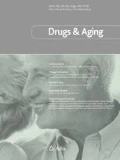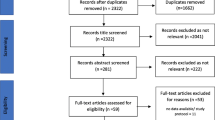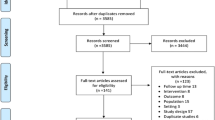Abstract
Background
Overuse of unnecessary medications in frail older adults with limited life expectancy remains an understudied challenge.
Objective
To identify intervention studies that reduced use of unnecessary medications in frail older adults. A secondary goal was to identify and review studies focusing on patients approaching end of life. We examined criteria for identifying unnecessary medications, intervention processes for medication reduction, and intervention effectiveness.
Methods
A systematic review of English articles using MEDLINE, EMBASE, and International Pharmaceutical Abstracts from January 1966 to September 2012. Additional studies were identified by searching bibliographies. Search terms included prescription drugs, drug utilization, hospice or palliative care, and appropriate or inappropriate. A manual review of 971 identified abstracts for the inclusion criteria (study included an intervention to reduce chronic medication use; at least 5 participants; population included patients aged at least 65 years, hospice enrollment, or indication of frailty or risk of functional decline—including assisted living or nursing home residence, inpatient hospitalization) yielded 60 articles for full review by 3 investigators. After exclusion of review articles, interventions targeting acute medications, or studies exclusively in the intensive care unit, 36 articles were retained (including 13 identified by bibliography review). Articles were extracted for study design, study setting, intervention description, criteria for identifying unnecessary medication use, and intervention outcomes.
Results
The studies included 15 randomized controlled trials, 4 non-randomized trials, 6 pre-post studies, and 11 case series. Control groups were used in over half of the studies (n = 20). Study populations varied and included residents of nursing homes and assisted living facilities (n = 16), hospitalized patients (n = 14), hospice/palliative care patients (n = 3), home care patients (n = 2), and frail or disabled community-dwelling patients (n = 1). The majority of studies (n = 21) used implicit criteria to identify unnecessary medications (including drugs without indication, unnecessary duplication, and lack of effectiveness); only one study incorporated patient preference into prescribing criteria. Most (25) interventions were led by or involved pharmacists, 4 used academic detailing, 2 used audit and feedback reports targeting prescribers, and 5 involved physician-led medication reviews. Overall intervention effect sizes could not be determined due to heterogeneity of study designs, samples, and measures.
Conclusions
Very little rigorous research has been conducted on reducing unnecessary medications in frail older adults or patients approaching end of life.

Similar content being viewed by others
References
Holmes HM, Hayley DC, Alexander GC, Sachs GA. Reconsidering medication appropriateness for patients late in life. Arch Intern Med. 2006;166:605–9.
Lee SP, Bain KT, Maio V. Appropriate discontinuation of medications at the end of life: a need to establish consensus criteria. Am J Med Qual. 2007;22:393–4.
Stevenson J, Abernethy AP, Miller C, Currow DC. Managing comorbidities in patients at the end of life. Br Med J. 2004;329:909–12.
Rollason V, Vogt N. Reduction of polypharmacy in the elderly: a systematic review of the role of the pharmacist. Drugs Aging. 2003;20:817–32.
Marcum ZA, Handler SM, Wright R, Hanlon JT. Interventions to improve suboptimal prescribing in nursing homes: A narrative review. Am J Geriatr Pharmacother. 2010;8:183–200.
Verrue CL, Petrovic M, Mehuys E, Remon JP. Vander Stichele R. Pharmacists’ interventions for optimization of medication use in nursing homes : a systematic review. Drugs Aging. 2009;26:37–49.
McGhan WF, Wertheimer AI, Marttila JK. Assessing the need for pharmacist-conducted drug regimen reviews in skilled nursing and intermediate care facilities. Contemp Pharm Pract. 1980;3:203–9.
Forsetlund L, Eike MC, Gjerberg E, Vist GE. Effect of interventions to reduce potentially inappropriate use of drugs in nursing homes: a systematic review of randomized controlled trials. BMC Geriatr. 2011;11:16. http://www.biomedcentral.com/1471-2318/11/16
Cruz-Jentoft AJ, Boland B, Rexach L. Drug therapy optimization at the end of life. Drugs Aging. 2012;29:511–21.
Omnibus Budget Reconciliation Act of 1987 [OBRA-87], U.S.C. § 1395i-3 (1987).
Currow DC, Stevenson JP, Abernethy AP, Plummer J, Shelby-James TM. Prescribing in palliative care as death approaches. J Am Geriatr Soc. 2007;55:590–5.
Tjia J, Rothman MR, Kiely DK, Shaffer ML, Holmes HM, Sachs GA, et al. Daily medication use in nursing home residents with advanced dementia. J Am Geriatr Soc. 2010;58:880–8.
Blass DM, Black BS, Phillips H, Finucane T, Baker A, Loreck D, et al. Medication use in nursing home residents with advanced dementia. Int J Geriatr Psychiatry. 2008;23:490–6.
Holmes HM, Sachs GA, Shega JW, Hougham GW. Cox Hayley D, Dale W. Integrating palliative medicine into the care of persons with advanced dementia: identifying appropriate medication use. J Am Geriatr Soc. 2008;56:1306–11.
Bell CM, Brener SS, Gunraj N, Huo C, Bierman AS, Scales DC, et al. Association of ICU or hospital admission with unintentional discontinuation of medications for chronic diseases. JAMA. 2011;306:840–7.
Hanlon JT, Schmader KE, Samsa GP, Weinberger M, Uttech KM, Lewis IK, et al. A method for assessing drug therapy appropriateness. J Clin Epidemiol. 1992;45:1045–51.
Beers MH, Ouslander JG, Rollingher I, Reuben DB, Brooks J, Beck JC. Explicit criteria for determining inappropriate medication use in nursing home residents. Arch Intern Med. 1991;151:1825–32.
The American Geriatrics Society 2012 Beers Criteria Update Expert Panel. American Geriatrics Society updated Beers criteria for potentially inappropriate medication use in older adults. J Am Geriatr Soc 2012;60:616–31.
Roberts MS, Stokes JA, King MA, Lynne TA, Purdie DM, Glasziou PP, et al. Outcomes of a randomized controlled trial of a clinical pharmacy intervention in 52 nursing homes. Br J Clin Pharmacol. 2001;51:257–65.
Brown BK, Earnhart J. Pharmacists and their effectiveness in ensuring the appropriateness of the chronic medication regimens of geriatric inpatients. Consult Pharm. 2004;19:432–6.
Flood KL, Carroll MB, Le CV, Brown CJ. Polypharmacy in hospitalized older adult cancer patients: experience from a prospective, observational study of an oncology-acute care for elders unit. Am J Geriatr Pharmacother. 2009;7:151–8.
Ray WA, Taylor JA, Meador KG, Lichtenstein MJ, Griffin MR, Fought R, et al. Reducing antipsychotic drug use in nursing homes. A controlled trial of provider education. Arch Intern Med. 1993;153:713–21.
Avorn J, Soumerai SB, Everitt DE, Ross-Degnan D, Beers MH, Sherman D, et al. A randomized trial of a program to reduce the use of psychoactive drugs in nursing homes. N Engl J Med. 1992;327:168–73.
Schmidt I, Claesson CB, Westerholm B, Nilsson LG, Svarstad BL. The impact of regular multidisciplinary team interventions on psychotropic prescribing in Swedish nursing homes. J Am Geriatr Soc. 1998;46:77–82.
Elliott RA, Woodward MC, Oborne CA. Improving benzodiazepine prescribing for elderly hospital inpatients using audit and multidisciplinary feedback. Intern Med J. 2001;31:529–35.
Gurwitz JH, Noonan JP, Soumerai SB. Reducing the use of H2-receptor antagonists in the long-term-care setting. J Am Geriatr Soc. 1992;40:359–64.
Stein CM, Griffin MR, Taylor JA, Pichert JW, Brandt KD, Ray WA. Educational program for nursing home physicians and staff to reduce use of non-steroidal anti-inflammatory drugs among nursing home residents: a randomized controlled trial. Med Care. 2001;39:436–45.
Gallagher PF, O’Connor MN, O’Mahony D. Prevention of potentially inappropriate prescribing for elderly patients. Clinical Pharm Ther. 2011;89:45–854.
Lang PO, Vogt-Ferrier N, Hasso Y, et al. Interdisciplinary geriatric and psychiatric care reduces potentially inappropriate prescribing in the hospital: interventional study of 150 actuely ill elderly patients with mental and somatic comorbid conditions. JAMDA. 2012;13:406.e1–7.
Davis RG, Hepfinger CA, Sauer KA, Wilhardt MS. Retrospective evaluation of medication appropriateness and clinical pharmacist drug therapy recommendations for home-based primary care veterans. Am J Geriatr Pharmacother. 2007;5:40–7.
Stuijt CC, Franssen EJ, Egberts AC, Hudson SA. Appropriateness of prescribing among elderly patients in a Dutch residential home: observational study of outcomes after a pharmacist-led medication review. Drugs Aging. 2008;25:947–54.
Bergkvist A, Midlov P, Hoglund P, Larsson L, Eriksson T. A multi-intervention approach on drug therapy can lead to a more appropriate drug use in the elderly. LIMM-Landskrona Integrated Medicines Management. J Eval Clin Pract. 2009;15:660–7.
Crotty M, Rowett D, Spurling L, Giles LC, Phillips PA. Does the addition of a pharmacist transition coordinator improve evidence-based medication management and health outcomes in older adults moving from the hospital to a long-term care facility? Results of a randomized, controlled trial. Am J Geriatr Pharmacother. 2004;2:257–64.
Crotty M, Halbert J, Rowett D, Giles L, Birks R, Williams H, et al. An outreach geriatric medication advisory service in residential aged care: a randomised controlled trial of case conferencing. Age Ageing. 2004;33:612–7.
Owens NJ, Sherburne NJ, Silliman RA, Fretwell MD. The Senior Care Study. The optimal use of medications in acutely ill older patients. J Am Geriatr Soc. 1990;38:1082–7.
Suhrie EM, Hanlon JT, Jaffe EJ, Sevick MA, Ruby CM, Aspinall SL. Impact of a geriatric nursing home palliative care service on unnecessary medication prescribing. Am J Geriatr Pharmacother. 2009;7:20–5.
Hellstrom LM, Bondesson A, Hoglun P, Midlov P, Holmdahl L, Rickhag E, Eriksson T. Impact of the Lund Integrated Medicines Management (LIMM) model on medication appropriateness and drug-related hospital revisits. Eur J Clin Pharmacol. 2011;67:741–52.
Allard J, Hebert R, Rioux M, Asselin J, Voyer L. Efficacy of a clinical medication review on the number of potentially inappropriate prescriptions prescribed for community-dwelling elderly people. CMAJ. 2001;164:1291–6.
Jeffery S, Ruby CM, Twesky J, Hanlon JT. Effect of an interdisciplinary team on suboptimal prescribing in a long-term care facility. Consult Pharm. 1999;14:1386–91.
Schmader KE, Hanlon JT, Pieper CF, Sloane R, Ruby CM, Twersky J, et al. Effects of geriatric evaluation and management on adverse drug reactions and suboptimal prescribing in the frail elderly. Am J Med. 2004;116:394–401.
Spinewine A, Swine C, Dhillon S, Lambert P, Nachega JB, Wilmotte L, et al. Effect of a collaborative approach on the quality of prescribing for geriatric inpatients: a randomized, controlled trial. J Am Geriatr Soc. 2007;55:658–65.
Lee J, McPherson ML. Outcomes of recommendations by hospice pharmacists. Am J Health Syst Pharm. 2006;63:2235–9.
Lipton HL, Bero LA, Bird JA, McPhee SJ. The impact of clinical pharmacists’ consultations on physicians’ geriatric drug prescribing. A randomized controlled trial. Med Care. 1992;30:646–58.
Lucas C, Glare PA, Sykes JV. Contribution of a liaison clinical pharmacist to an inpatient palliative care unit. Palliat Med. 1997;11:209–16.
Mannheimer B, Ulfvarson J, Eklof S, Bergqvist M, Andersen-Karlsson E, Pettersson H, et al. Drug-related problems and pharmacotherapeutic advisory intervention at a medicine clinic. Eur J Clin Pharmacol. 2006;62:1075–81.
Triller DM, Clause SL, Briceland LL, Hamilton RA. Resolution of drug-related problems in home care patients through a pharmacy referral service. Am J Health Syst Pharm. 2003;60:905–10.
Halvorsen KH, Ruths S, Granas AG, Viktil KK. Multidisciplinary intervention to identify and resolve drug-related problems in Norwegian nursing homes. Scand J Prim Health Care. 2010;28:82–8.
Brulhart MI, Wermeille JP. Multidisciplinary medication review: evaluation of a pharmaceutical care model for nursing homes. Int J Clin Pharm. 2011;33:549–57.
Olsson IN, Curman B, Engfeldt P. Patient focused drug surveillance of elderly patients in nursing homes. Pharmacoepidemiol Drug Saf. 2010;19:150–7.
Garfinkel D, Zur-Gil S, Ben-Israel J. The war against polypharmacy: a new cost-effective geriatric-palliative approach for improving drug therapy in disabled elderly people. Isr Med Assoc J. 2007;9:430–4.
Garfinkel D, Mangin D. Feasibility study of a systematic approach for discontinuation of multiple medications in older adults. Arch Intern Med. 2010;170:1648–54.
Bajorek BV, Krass I, Ogle SJ, Duguid MJ, Shenfield GM. Optimizing the use of antithrombotic therapy for atrial fibrillation in older people: a pharmacist-led multidisciplinary intervention. J Am Geriatr Soc. 2005;53:1912–20.
Furniss L, Burns A, Craig SK, Scobie S, Cooke J, Faragher B. Effects of a pharmacist’s medication review in nursing homes. Randomised controlled trial. Br J Psychiatry. 2000;176:563–7.
Fossey J, Ballard C, Juszczak E, James I, Alder N, Jacoby R, et al. Effect of enhanced psychosocial care on antipsychotic use in nursing home residents with severe dementia: cluster randomised trial. BMJ. 2006;332:756–61.
Alexander GC, Sayla MA, Holmes HM, Sachs GA. Prioritizing and stopping prescription medicines. CMAJ. 2006;174:1083–4.
Woodward M. Deprescribing: achieving better health outcomes for older people through reducing medications. J Pharm Pract Res. 2003;33:323–8.
Scott IA, Gray LC, Martin JH, Mitchell CA. Minimizing inappropriate medications in older populations: a 10-step conceptual framework. Am J Med. 2012;125:529–37.
Tjia J, Givens JL. Ethical framework for medication discontinuation in nursing home residents with limited life expectancy. Clin Geriatr Med. 2012;28:255–72.
le Grand A, Hogerzeil H, Haaijer-Ruskamp F. Intervention research in rational use of drugs: a review. Health Policy Plan. 1999;14:89–102.
Bain KT, Holmes HM, Beers MH, Maio V, Handler SM, Pauker SG. Discontinuing medications: a novel approach for revising the prescribing stage of the medication-use process. J Am Geriatr Soc. 2008;56:1946–52.
Avorn J, Gurwitz JH. Drug use in the nursing home. Ann Intern Med. 1995;123:195–204.
Cipolle RJ, Strand LM, Morley PC. Pharmaceutical care practice: the clinician’s guide. 2nd ed. New York: McGraw-Hill; 2004. p. 394.
Ruths S, Viktil KK, Blix HS. Classification of drug-related problems. Tidsskr Nor Laegeforen. 2007;127:3073–6.
Howard R, Ballard C, O’Brien J, Burns A. Guidelines for the management of agitation in dementia. Int J Geriatr Psychiatry. 2001;16:714–7.
Acknowledgements
Ms. Velten was supported by a Medical Student Training in Aging Research grant by the American Federation for Aging Research. Dr. Parsons was funded by a travel grant from the School of Pharmacy, Queens University Belfast. Dr. Briesacher was supported by a Research Scientist Development Award from the National Institute of Aging (K01 AG031836). The study funders had no role in the study design, collection, analysis and interpretation of the data, writing of the manuscript, or decision to submit the manuscript for publication. Dr. Tjia was responsible for conceiving and planning the work, acquisition, analysis and interpretation of the data, and writing of the manuscript. Ms. Velten, Dr. Parsons, and Dr. Briesacher were responsible for acquisition and analysis of the data and contributed to writing of the manuscript. Ms. Valluri was responsible for data analysis and writing of the manuscript. The authors acknowledge Dr. Jerry Gurwitz for his support of this project and assistance obtaining funding for Ms. Velten, and Ms. Colleen Biggins and Mr. Shawn Gagne for assistance with preparation of this manuscript.
Conflict of Interest Statement
Dr. Briesacher received consulting funds from Novartis during the period of this work.
Author information
Authors and Affiliations
Corresponding author
Appendix
Appendix
PUBMED search strategy: (“nursing homes”[MeSH] AND ([“prospective studies”[MeSH] or “retrospective studies”[MeSH] or “clinical trial”[MeSH]) AND (“drug utilization”[MeSH] or “prescription drugs”[MeSH] or “prescriptions” or “dementia/drug therapy”]). We combined these results with a search for (((“prospective studies”[MeSH] OR “retrospective studies”[MeSH] OR “clinical trial “[Publication Type] OR “drug utilization review”[MeSH]) AND (“prescriptions”[MeSH] OR “drug prescriptions”[MeSH] OR “drug utilization”[MeSH] OR “dementia/drug therapy”[MeSH] OR “dementia/therapy”[MeSH] OR “drug utilization/standards”[MeSH] OR “drug utilization/statistics and numerical data”[MeSH] OR “drug utilization/trends”[MeSH])) AND (“hospice” OR “hospices” OR “hospice care” OR “palliative care” OR “cancer” OR “end of life” OR “terminal illness” OR “terminally ill”)) AND ((“appropriate*” OR “inappropriate*” OR “drug related problems”) AND (“medication*” OR “prescribing*”)) AND (“criteria” OR “screening tool” OR “list” OR “index” OR “recommendations” OR “Delphi technique”).
IPA search strategies: (“prescriptions” or “drug prescriptions” or “drug utilization” or “dementia/drug therapy” or “dementia/therapy”) and ((“appropriate” or “inappropriate”) and (“medications” or “prescribing”)) and (“criteria” or “screening tool” or “list” or “index” or “recommendations” or “Delphi technique”)).mp.
EMBASE search strategies: ((“prospective studies” or “retrospective studies” or “clinical trial”) and (“prescriptions” or “drug prescriptions” or “drug utilization” or “dementia/drug therapy” or “dementia/therapy”) and ((“appropriate” or “inappropriate”) and (“medications” or “prescribing”)) and (“criteria” or “screening tool” or “list” or “index” or “recommendations” or “Delphi technique”)).mp.
Rights and permissions
About this article
Cite this article
Tjia, J., Velten, S.J., Parsons, C. et al. Studies to Reduce Unnecessary Medication Use in Frail Older Adults: A Systematic Review. Drugs Aging 30, 285–307 (2013). https://doi.org/10.1007/s40266-013-0064-1
Published:
Issue Date:
DOI: https://doi.org/10.1007/s40266-013-0064-1




